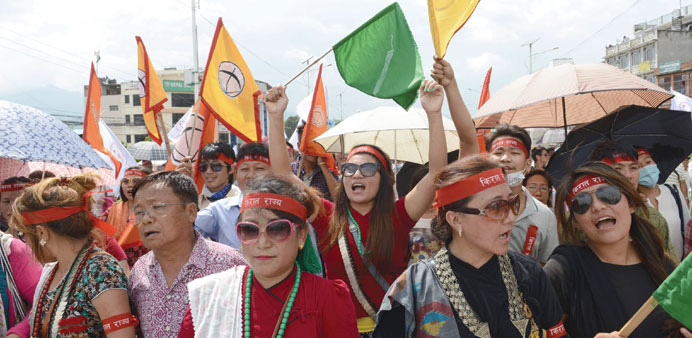Activists from the Nepal Federation of Indigenous Nationalities (NEFIN) take part in rally demanding secularism in the new constitution in Kathmandu yesterday. UN High Commissioner for Human Rights Rupert Colville said there was a clear risk that the protests and violence would continue to feed off each other in the coming days unless all sides change their approach.
IANS
Kathmandu
UN High Commissioner for Human Rights Rupert Colville has expressed concern over reports from Nepal of continuing political violence, saying a change of approach was the need of the hour.
A day after seven security personnel and three protesters were reportedly killed in Nepal, Colville said there was a clear risk that the protests and violence would continue to feed off each other in the coming days unless all sides change their approach.
On Tuesday, western Nepal remained tense with curfew imposed in several parts of the country and some districts declared riot-affected areas.
The victims included the two-year-old son of a police officer killed in Monday’s violence in Tikapur, Kailai while protesters demanded a separate Tharu state. This is in addition to the deaths of five protesters during widespread demonstrations since an August 8 agreement by political parties on redrawing internal state boundaries.
“The agreement was the product of extended negotiations to draw up a new constitution further to the Comprehensive Peace Agreement that ended the 10-year internal conflict in 2006. Since the political agreement was reached, increasingly violent protests and strikes against the proposed delineation have taken place throughout the country,” said Colville in a statement.
The rights to freedom of expression, association and assembly are essential elements in the promotion of democracy and human rights, he said, adding that likewise, protests should be carried out in a peaceful manner.
“We urge the government of Nepal to create a climate where minority or dissenting views or beliefs are respected, and security forces only employ force as a last resort and in full accordance with the standards laid out under international law for maintaining public order, including detailed guidelines governing the use of live ammunition,” Colville added.
“Moreover, protesters should not pursue violent confrontations with the security services,” he said.
Urging political leaders and protesters to sit down together to find a peaceful solution to the current situation before the rising violence spirals out of control, the UN high commissioner said: “We fully support the call of the Nepal National Human Rights Commission for an independent, thorough and impartial investigation into all deaths and injuries resulting from the alleged use of disproportionate force by security personnel, as well as into the deaths of the seven security personnel killed on Monday.”
Meanwhile, Indian Ambassador to Nepal Ranjit Rae on Tuesday met Nepal’s Deputy Prime Minister and Home Minister Bamdev Gautam and told him that India or its citizens were not involved in protests or riots that have erupted across the Himalayan nation over the proposed six-province model of the proposed constitution for the country.
In his address to parliament after a deadly clash on Monday led to the death of at least 20 people, including 17 security personnel, Gautam indicated that some unwanted elements entered the country through the southern border and made the situation worse.
Rae met Gautam at the minister’s office on Tuesday.
After the meeting, the Indian embassy said its attention was drawn to the statement by Gautam regarding the sequence of events leading to violence in many parts of Nepal on Monday.
Gautam said he had heard that “a large number of intruders from the south” had entered Gaur and Rautahat regions of Nepal, the embassy said.
The Indian ambassador conveyed the embassy’s concerns about the statement and similar unsubstantiated statements that could cause misunderstanding and distort perceptions about the cordial and friendly relations between the two countries, said a statement from the embassy. “The embassy wishes to clarify that it has not been contacted by the Nepalese authorities about any unusual movement of people across the border in recent days,” it said.
It said the Indian border authorities “keep in constant touch” with their Nepali counterparts and continue to monitor the situation.
In a statement after the meeting, Nepal’s home ministry said Gautam drew the attention of the Indian ambassador “to ensure that the Nepal-India border is not misused by infiltrators to affect demonstrations” in the country.
In the meeting, Gautam “pointed to the need for both Nepal and India to be alert as some unscrupulous people could take undue advantage of the open border to infiltrate into demonstrations being staged in different parts of the Terai region”.
It said that in the meeting, Rae said India “was deeply shocked” by the violent protests and said the country will not allow misuse of the border for infiltration into Nepal.

